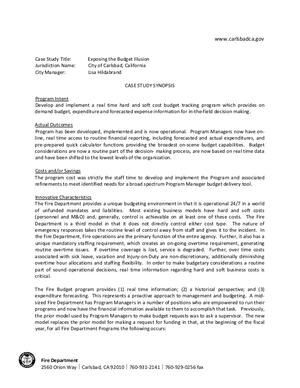
The Fire Department provides a unique budgeting environment in that it is operational 24/7 in a world of unfunded mandates and liabilities. Most existing business models have hard and soft costs (personnel and M&O) and, generally, control is achievable on at least one of these costs. The Fire Department is a third model in that it does not directly control either cost type. The nature of emergency responses takes the routine level of control away from staff and gives it to the incident. In the Fire Department, Fire operations are the primary function of the entire agency. Further, it also has a unique mandatory staffing requirement, which creates an on-going overtime requirement, generating routine overtime issues. If overtime coverage is lost, service is degraded. Further, over time costs associated with sick leave, vacation and Injury-on-Duty are non-discretionary, additionally diminishing overtime hour allocations and staffing flexibility. In order to make budgetary considerations a routine part of sound operational decisions, real time information regarding hard and soft business costs is critical. The Fire Budget program provides (1) real time information; (2) a historical perspective; and (3) expenditure forecasting. This represents a proactive approach to management and budgeting.
